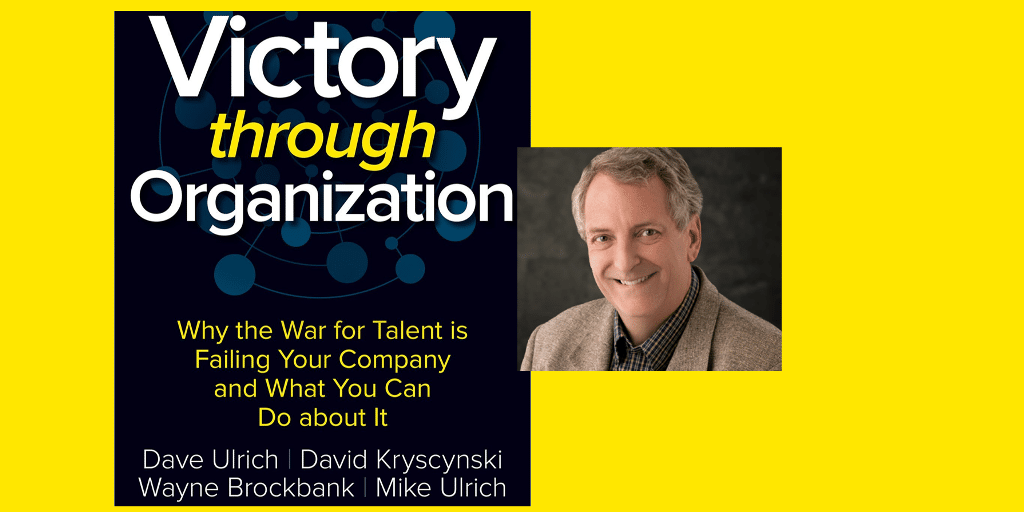INTERVIEW: Dave Ulrich on How To Win the War for Talent
The term “war for talent” was first used in 2001 in a Harvard Business Press book by the same name. It refers to a competitive landscape in recruiting and retention. Given the recent shift to a candidate-driven market and other indicators like low unemployment, the use of war for talent seems very appropriate.
Dave Ulrich and his colleagues have a new book out on the topic titled “Victory Through Organization: Why the War for Talent is Failing Your Company and What You Can Do About It”. I feel like he needs no introduction in the HR world. But that just wouldn’t be proper. Dr. Ulrich is the Rensis Likert Professor at the Ross School of Business, University of Michigan and a partner at The RBL Group, a consulting firm focused on helping organizations and leaders deliver value.
I had the chance to chat with him a few years ago about the future of the HR profession. And I’m delighted he agreed to talk with me about his new book and the war for talent.
Dr. Ulrich, the very first sentence in your new book says, “HR is not about HR. HR begins and ends with the business.” On one level, I get it. But isn’t that just another ‘seat at the table’ reference?
[Ulrich] The metaphor of ‘getting a seat at the table’ is about HR having access to and influence on business results. This aspiration becomes somewhat trite unless and until HR actually contributes to business results. In our research with 32,000 people in 1,400 businesses (with 22 global regional partners), we found that the competencies required to get to the table are different from the competencies required to deliver real business value.
Getting invited to business discussions (seat at the table metaphor) comes when HR professionals are credible activists. But, once invited, HR professionals have to deliver value to key stakeholders both inside (employees, line managers) and outside (customers, investors) the company. Stakeholder value to those outside the company increases when HR professionals are strategic positioners. Then, to deliver real business value, HR professionals need to be paradox navigators. Gaining the seat is not necessarily delivering once in the dialogue.
Who should own the war for talent and why?
[Ulrich] We are quite clear that line managers are the ‘owners’ of talent. They are ultimately responsible and accountable. Qualified HR professionals are architects who create the systems and anthropologists who recognize the context. (Editor’s note: I wholeheartedly agree that HR pros are the architects of work).
The book shares an HR competency model with three core drivers: credible activist, strategic positioner, and paradox navigator. Over the years, we’ve both seen all the articles about “this is what HR needs to do”, etc. How do HR professionals know the best advice to follow?
[Ulrich] In the HR field (like other fields), there are a lot of opinions, generally based on good intent and personal experience. While each person’s experience is unique and valuable, it is useful to rely on large data sets to see trends individuals might miss. HR pros recognize and accept data based decision making to ensure that their personal experiences culminate in real success. In addition, we are convinced that it is NOT just the HR competencies, but their impact on key outcomes of personal effectiveness, stakeholder value, and business results. HR pros should use their personal judgment as informed by rigorous theory and research.
Where do you see the role of technology in human resources?
[Ulrich] We have identified four stages of HR technology in delivering value. We have proposed an HR technology audit as each of these stages enables HR to use technology to increase value.
- Stage 1 is efficiency and technology enables more cost efficiency delivery of HR services.
- Stage 2 is innovation and HR technology allows for innovation in staffing, training, performance management, rewards, and communication. Much of the machine learning, automation, and robotics exists to create such innovation.
- Stage 3 is information and technology helps organizations source and act on external data that informs choices.
- Stage 4 is connection and technology connects people to each other inside and suppliers, customers, and investors outside and connects people to their organizations.
[clickToTweet tweet=”Dave Ulrich: how to win the war for talent” quote=”Dave Ulrich: how to win the war for talent” theme=”style3″]
IMHO, the challenges of finding and keeping talent aren’t going away anytime soon. If HR could only do one thing that would have the fastest impact, what would it be?
[Ulrich] Talent continues to be a real challenge for organizations. We have seen that many organizations have learned where and how to source talent, bring talent on board, reward and motivate talent, and retain the best talent.
We believe that many of the top employees have enormous choice over where they work, and leading organizations are working to help employees find meaning and purpose from work (see Why of Work). In addition, our research convincingly found that the quality of the organization (however labeled … the systems, teams, processes, or capabilities) has 4 times the impact on business results as talent! This means that HR professionals should be at least as concerned about the technical competencies of the individuals as the social and cultural fit in the organization. Talent matters, but organization matters more.
My thanks to Dr. Ulrich for giving us a sneak peek into his new book, “Victory Through Organization”. If you want to read more, download chapter one (FREE!)
It’s no surprise that attracting, engaging, and retaining talent is a key initiative for organizations. This challenge – the war for talent – places a lot of pressure on human resources. We need to be tech-savvy, process-driven coaches for the business. While it’s a tall order, it’s also a great opportunity for HR to bring business value to the organization.
4